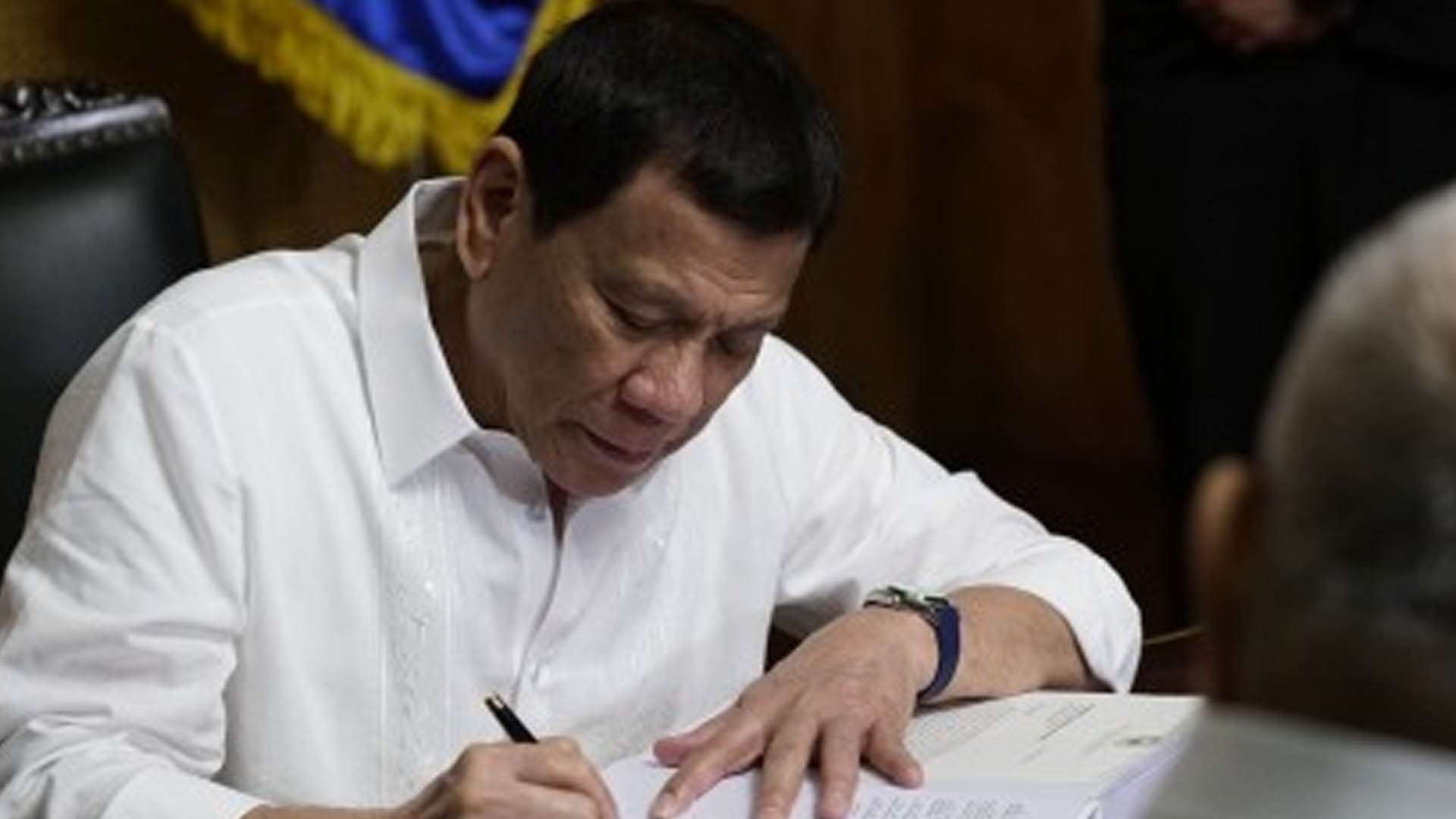President Rodrigo Duterte has signed an executive order (EO) transferring executive functions to local government units (LGUs).
EO 138, signed by Duterte on June 1, transfers basic services and facilities to the LGUs so that “national government agencies can assume more strategic and steering functions to address persistent development issues.”
Under the EO, the national government agencies (NGAs) concerned and all LGUs shall prepare their respective devolution transition plans (DTPs) which conform to the guidelines to be jointly issued by the Department of Budget and Management (DBM) and the Department of the Interior and Local Government (DILG).
“There shall be only one DTP for each department, which shall already cover the agencies and government-owned or -controlled corporations (GOCCs) under the control or supervision or attached to such department. The department secretaries shall lead and oversee the preparation and implementation of their DTPs,” the EO read.
Agencies and instrumentalities not under the control or supervision or attached to a department shall prepare and implement their own DTPs in consultation and coordination with the DBM and DILG.
The NGA DTPs shall identify and clarify the functions and services devolved to the LGUs, by level of LGU, based on Republic Act 7160 or the Local Government Code and other relevant laws, and the strategy for and phasing of devolution to the LGUs.
They shall also include the definition of standards for the delivery of devolved services; strategy for the capacity development of the LGUs; framework for monitoring and performance assessment of the LGUs; and an organizational effectiveness proposal to strengthen the department/agency in assuming “steering functions” as part of the devolution efforts.
The NGAs concerned may consult and collaborate with the DILG, National Economic and Development Authority (NEDA), Department of Finance (DOF), Civil Service Commission (CSC), and the Development Academy of the Philippines (DAP), and other resource institutions for technical assistance in the preparation of their respective DTPs.
The DTP shall be submitted by the NGAs concerned to the DBM within 120 days from the effectivity date of this order, for evaluation and approval.
“The National Government (NG) is fully committed to the policy of decentralization enshrined in the Constitution and relevant laws which are aimed at (i) development capabilities of local governments to deliver basic social services and critical facilities to their constituents, increase productivity and employment, and promote local economic growth; and (ii) ensuring accountability, competence, professionalism and transparency of local leaders through the development of institutional systems that uphold good governance and strengthen their capacities for managing public resources,” the EO read.
ComDev
EO 138 also creates a Committee on Devolution (ComDev) chaired by the DBM Secretary and co-chaired by the DILG Secretary.
Its members include the Socioeconomic Planning Secretary, DOF Secretary, Executive Secretary, and Presidents of the Leagues of Provinces, Cities and Municipalities of the Philippines, the Liga ng mga Barangay ng Pilipinas, and the Union of Local Authorities of the Philippines.
The ComDev chairperson, co-chairperson and members from the government sector shall designate, within 15 days from the effectivity date of this order, a senior official within their respective departments, with a rank not lower than an undersecretary or its equivalent, to act as their permanent representative in the ComDev and who shall be responsible for overseeing their respective agency’s overall efforts on the implementation of this order.
Alternates from the various leagues shall be endorsed by their organizational heads.
The DBM shall provide secretariat services to the ComDev.
Functions of the ComDev include overseeing and monitoring the implementation of administrative and fiscal decentralization goals of this order; evaluating the status and monitor the implementation of the DTPs of NGAs and LGUs, and ensuring compliance of NG officials or employees and local chief executives or personnel, and initiate appropriate action(s) as may be warranted.
The ComDev is tasked to resolve issues and concerns that may arise in the implementation of this Order, without prejudice to the respective mandates of its member-agencies in individually resolving the same; ensure the elimination of any regulatory or fiscal controls on the automatic release of LGU shares on national taxes; and adopt mechanisms to ensure continuous delivery of public services by the NGAs and the LGUs during the transition period to full devolution;
The ComDev must also develop a strong communications plan and pursue strategies to effectively inform the public, as well as other stakeholders, on the delineation of the functions between the NGAs and the LGUs, and their respective accountabilities.
For this purpose, the ComDev may tap the Presidential Communications Operations Office (PCOO) and its attached agencies and offices, call upon all NGAs, both the oversight and the affected agencies, to designate focal officials and personnel who shall participate in this information drive, and ensure the integration of the ComDev’s key messaging and communications plan to their respective agencies’ communication efforts;
A Growth Equity Fund (GEF) shall be proposed by the ComDev to Congress to address issues on marginalization, unequal development, high poverty incidence, and disparities in the net fiscal capacities of LGUs.
The amount constituting the GEF shall be included by the DBM in the National Expenditure Program starting FY 2022 and thereafter, to cover the funding requirements of programs, projects and activities of poor, disadvantaged and lagging LGUs to gradually enable the full and efficient implementation of the functions and services devolved to them.
The GEF shall be released to the LGUs in accordance with the implementing rules and regulations to be prescribed by the Development Budget Coordination Committee.
It shall be subject to the mechanisms and guidelines for an equitable, performance-based, and time-bound allocation and distribution of the fund to the LGUs.
Under EO 138, any guidelines, rules or regulations issued in pursuance thereof, or any initiative towards the transition of devolved functions from the NGAs to the LGUs, shall not operate to suspend or exempt any government office or personnel from compliance with the provisions of RA 11032 or the “Ease of Doing Business and Efficient Government Service Delivery Act of 2018.”


